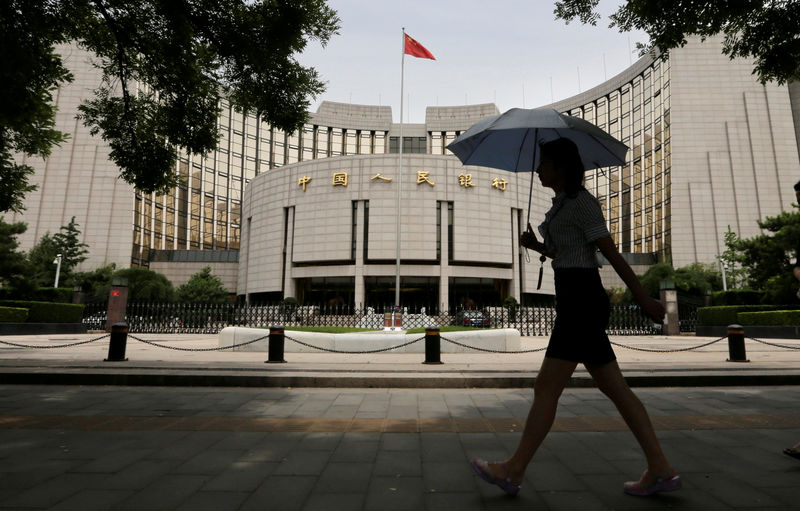By John Ruwitch and Winni Zhou
SHANGHAI (Reuters) - China's central bank nudged money market interest rates upward on Thursday just hours after the Federal Reserve raised the U.S. benchmark, as Beijing seeks to prevent destabilizing capital outflows without hurting economic growth.
Economists were surprised by the move but said at just five basis points, the increases were small and more symbolic than substantive.
The People's Bank of China called it a "normal market reaction" to the Fed that would keep interest rate expectations reasonable and help with the deleveraging campaign.
China's major stock indexes declined modestly after the news, with infrastructure, IT and financial shares down.
The PBOC increased rates on reverse repurchase agreements, or reverse repos, used for open market operations by 5 basis points for the 7-day and 28-day tenors.
It also said in a statement it increased rates on its one-year medium-term lending facility (MLF) also by 5 basis points.
Thursday's move was the first time the Chinese central bank has raised rates since March, but market interest rates have risen on their own during the interim as the government pursues a range of policies to lower leverage and debt in the economy.
Chen Ji, an analyst at Bank of Communications, said the rate increase was unexpected but too small to have much meaningful impact, and represented only a response to the Fed's rate hike.
"(It) doesn't really impact borrowing costs, and fluctuations of this level are very normal in the interbank market," he said, adding that he thought China's economy was not robust enough to handle a benchmark rate increase.
Ken Cheung, senior Asian forex strategist at Mizuho Bank Ltd in Hong Kong, also said the rise was surprising, and characterized the five basis point magnitude as "mild".
"This suggests that the PBOC's intention to balance the risk of over-tightening amid the deleveraging process," Cheung wrote in a note.
Benchmark one-year lending and deposit rates have remained unchanged since October 2015, but the PBOC has increasingly relied on market rates to guide the economy.
"The move also aims to shrink the gap between short-term and long-term rates to curb (financial institutions) from using short-term loans to invest long-term debt by overly adding leverage," Nie Wen, economist at Hwabao Trust in Shanghai.
Nie added that a "too aggressive" rate hike would have "too much" impact to real economy.
For details of the rates that were raised on Thursday, click on:
The PBOC has moved to a tightening bias this year following six benchmark interest rate cuts in 2014-2015 as the economy stabilizes and the focus turns toward credit risk.
In a statement accompanying the rate increases, the PBOC said on Thursday the upward adjustment reflected supply and demand in the market, and was a "normal market reaction" to Fed's rate increase.
It said the adjustment would help shape "reasonable" interest rate expectations.
At the same time, the rate hike would help prevent financial institutions from over-leveraging while helping control the overall macro leverage ratio.

As market rates have risen this year, the differential with official rates has widened. On Thursday, the volume-weighted average rate of the benchmark seven-day repo